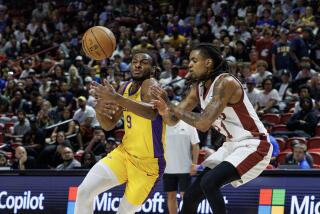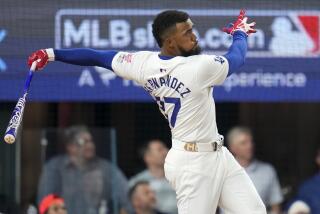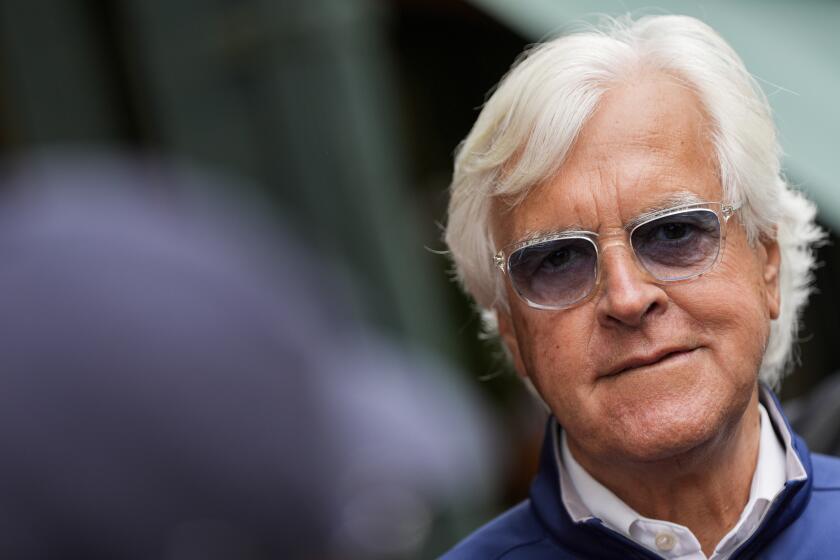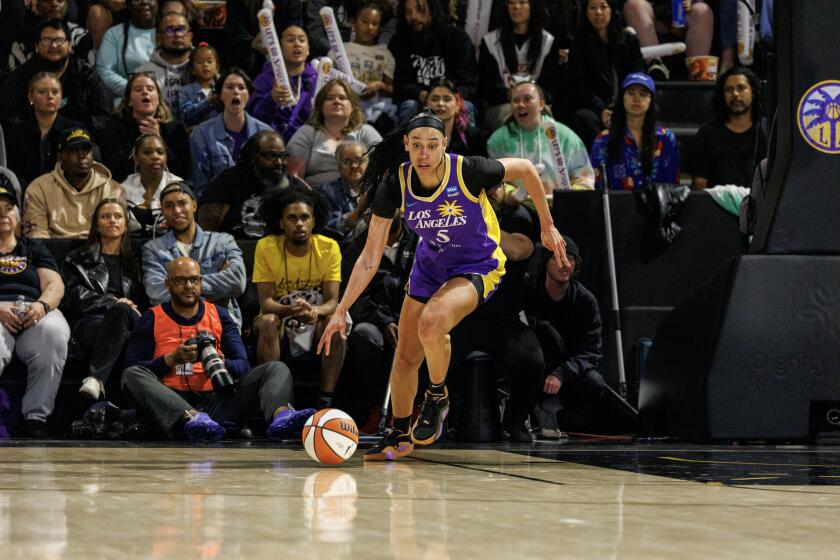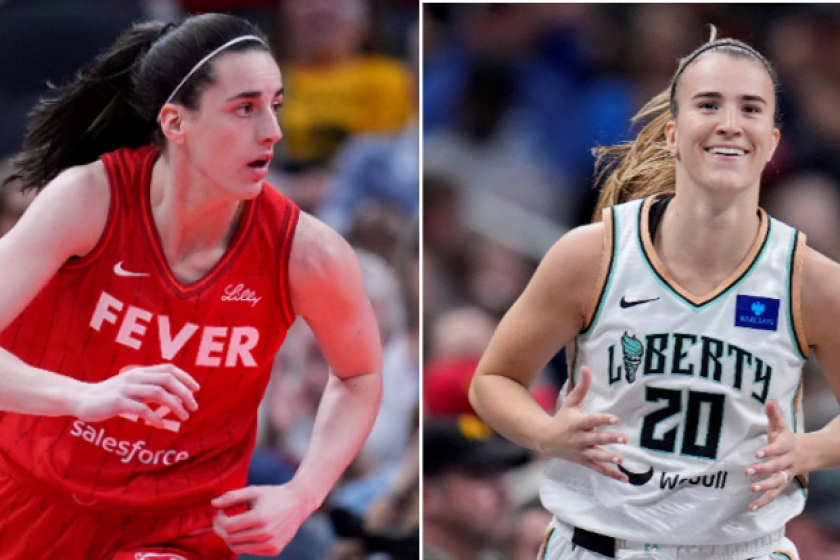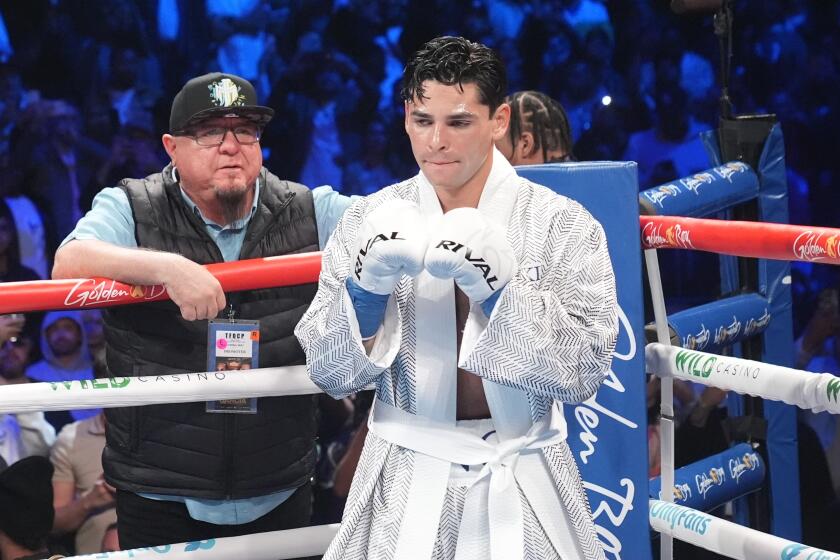WHERE ARE THEY NOW?: FRED RICO : Short Time in the Big Time : Former San Fernando Standout Carries Bittersweet Memories of Major Leagues
For Fred Rico, the memories were waiting. A burly, 5-foot-10, 180-pound power hitter, Rico blazed out of San Fernando High in 1962 on the way to . . . Cooperstown?
For starters, it was Arizona State on a baseball scholarship. From there, any major league city would do. He knew he could take care of the rest. The memories would take care of themselves.
Today at 48, three decades after being selected City Section player of the year, Rico, a Los Angeles County marshal in San Fernando Municipal Court, is still burly, still 5-10 and, at 190 pounds, still close to his playing weight. He remains a muscular specimen to behold with forearms resembling the limbs of an oak tree.
And he is still waiting for the memories.
Oh, he has a few. Good ones, in fact. Memories that would mesmerize fidgety grandchildren on both knees.
There are the two hits in his first two big league at-bats, both in Tiger Stadium in 1969 against the defending world champions. There is the foul ball he sprayed into the second deck at Anaheim Stadium that landed in his mother’s lap. There is the day he met Yankee great Mickey Mantle, his boyhood idol, during batting practice during his first trip to spring training.
His face graced a bubble gum card that proclaimed him one of the Kansas City Royals’ top rookies of 1970. He batted third in the lineup in his first major league game. He made headlines in Kansas City as an up-and-coming star.
First-class travel all the way. First-class hotels when he arrived. In between, first-class treatment by fans.
“Believe me, there was nothing better than playing major league baseball,” Rico says. “It is a feeling I can’t express.”
Rico had it all in the webbing of his glove. Yet throughout his 10 years in professional baseball, he spent only three months in the majors, just long enough to whet his appetite and short enough to leave a bad taste in his mouth to this day.
“I thought I was well on my way,” Rico says with a sigh, thumbing through a scrapbook of yellow newspaper clippings. “I really did.”
In July, 1969, Rico was promoted from the Royals’ triple-A affiliate in Omaha. Man walked on the moon that same month. But no one was riding higher than Rico the day he made it to the big show in Detroit.
Rico doubled inside third base off left-hander Mike Kilkenny. Two innings later, he lined a sharp single between third and short.
Rico’s face lights up at the memory. It’s as if it is 1969 again and he is toeing the bag at first, a tidy two for two.
“It was so exciting, I couldn’t believe it,” he says. “I was actually with the big club. When I was standing on first base, I’ll never forget, I thought, ‘If this is the big leagues, this is going to be easy.’ ”
Rico undoubtedly has told the story countless times, but it still causes him to break into a long, hearty laugh. After several seconds, the laughter subsides.
“Then I got picked off.”
Alfredo Cruz Rico, born on the Fourth of July in Jerome, Ariz., was as All-American as they come at San Fernando High.
He starred in football and baseball. He played flanker in the fall. He played almost everything--outfield, infield, catcher--in the spring. His senior year, he batted .523 with 13 runs batted to lead San Fernando to a 10-2 record and the East Valley League championship.
Rico confined his talents to two sports, but he probably could easily have tackled a third. Pete Kokon, a 79-year-old former sports columnist for the now-defunct Valley Times, recalls Rico as the best high school athlete he has ever seen.
“He was incredibly good,” Kokon said. “I remember he hit a home run at Grant High School that went across the street behind left field. Had to have gone over 400 feet. And that was before they used aluminum bats.”
Steve Marden, baseball coach at San Fernando High and a 1963 graduate of Cleveland High, remembers Rico likewise.
“Fred Rico is the most awesome hitter I have ever seen in high school in my life,” Marden said. “And I’m not just saying that now. I don’t ever remember a player who could punish a baseball the way Fred Rico could. He came back and hit one in an alumni game that is still going. The guy could probably make my varsity club tomorrow.”
But a funny thing happened to Rico on the way to the Hall of Fame. He never came close.
Rico, who maintained a .281 batting average in 10 professional seasons, had a knack of being on the receiving end of long talks with managers--well-meaning, grandfatherly types who before sending him to the minors draped an arm over his shoulder and shuffled him toward the far end of the dugout.
He finished the season with Kansas City in 1969 but never again made it to the big leagues. After spring training the following year, he was sent back to Omaha. Later that season, he was traded to St. Louis for Cookie Rojas. “He went to Kansas City,” Rico said. “I went to Tulsa.”
Rico was traded two more times before he retired in 1973. By then he had played for triple-A clubs of the Royals, Cardinals, Twins and Pirates. He learned to recognize the look in a manager’s eyes when he was about to be demoted.
In 1972, Rico was battling for the Twins’ backup catcher job with another young player by the name of Rick Dempsey. The final day of spring training, Minnesota Manager Bill Rigney took Rico aside.
“He pulls me into the dugout and says, ‘Rico, you can curse at me and call me every name in the book and you have every right to,’ ” Rico says. “ ‘But I’m sorry, we have to send you back to triple A.’ ”
Rico cursed. He called Rigney every name in the book. He demanded to be traded. He even flew home and told his family he was through with baseball. But the following week, he reported to Tacoma, Wash., where he batted .308 that season.
The memory causes Rico to turn a few pages in his scrapbook.
“I feel a lot of bitterness, a lot of emptiness, a lot of animosity,” Rico says. “My whole life, all I dreamed about was playing baseball and then they take it away from me.
“The only regret I have now is that I wasn’t able to sell myself--not statistical-wise, but by being able to say, ‘Hey, give me a chance.’ I was one of those quiet guys who sat in the dugout and waited for his name to be called. I always thought my stats would do my talking for me, but I guess that wasn’t necessarily true.”
Rico’s mother, Josephine Carlos, did her son’s talking for him when he graduated from high school.
Rico didn’t know whether to accept a four-year scholarship to Arizona State or sign with the Kansas City Athletics, who, he says, offered him a signing bonus of $90,000. Carlos claims her son was offered much less. But that isn’t why she persuaded him to decline the offer.
“It was a big decision because we could have used the money,” she says. “But I always wanted him to go to college. He let me decide. He said, ‘It’s up to you, mother.’ ”
It didn’t matter to Rico. He knew where he was going eventually and knew he would get there. Besides, Arizona State had a good baseball program known for producing major leaguers.
Rico, however, never played Division I ball. He sustained a hip fracture in a pole vaulting accident during the off-season and left the school after only one year. He spent a year at Pierce College before signing with the Orioles for $4,000 in 1964.
In 1966, he went to spring training with the big club. “I walked into the clubhouse and saw Frank Robinson and Brooks Robinson,” he says. “I thought I was dreaming.”
He was certain of it when he met Mantle shagging flies in Florida. “He said hi, and I said hi back,” Rico says. “I just about fainted. I called up my parents and called up my friends.”
But he spent most of the rest of his career waiting to be called up to the majors. In 1968, the Royals claimed Rico in baseball’s expansion draft. After batting .296 with 80 RBIs and 20 triples at Omaha in ‘69, he was promoted to the big club along with a handful of the organization’s best minor-leaguers.
Rico finished the season with the Royals, playing in 10 games, nine in the outfield and one at third base. He collected six hits, including two doubles, in 26 at-bats for a .231 batting average and drove in two runs.
On Rico’s first West Coast trip with the club, about 30 members of his family and friends chartered a bus to Anaheim Stadium.
Rico pinch-hit late in the game. The bases were loaded, and Andy Messersmith was on the mound. Rico fouled a pitch into the stands, smack in the middle of his small army of fans. “It just seemed like he hit it straight at me,” Carlos says. “It landed right in my lap and then it kind of rolled away. But someone got it and gave it to me. It was incredible because there were about 30 of us and he hit it right to me.”
Carlos was saddened several years later when the ball was stolen from her home. But it is not what she is most saddened about.
“I’ve always felt guilty in my heart that I made him go to college because his dream was to play baseball,” she says. “I think he still dreams about it. When he’s watching a game, he gets that faraway look in his eyes. I know he’s my son, but he was a great player--a lot better than some of the players who are making millions today.”
Rico is still a celebrity, albeit a big fish in a small pond. Co-workers in the small courthouse prod Rico for stories about his playing days. “My judge likes to bring it up,” he says.
Among the memorabilia on his desk blotter are photographs from his playing days, including the baseball card. Also displayed are photographs of his five children: two daughters from his first marriage that ended in divorce in 1974, and three sons from his current wife, Rebecca. And his 4-year-old granddaughter.
Although he has been a marshal since 1974, Rico only recently began playing on the department’s softball team. He has played in alumni baseball games at San Fernando, where he moonlights as a security officer.
However, Rico is uneasy about being the center of attention, especially when the topic is his past.
“We’ve played golf together and talked about it,” Marden said. “I think it’s a sore subject with Fred. It’s funny how things sometimes don’t work out.”
Often, Rico is spotlighted at social gatherings by well-meaning friends.
“One thing I hate, sometimes, is when we’re around people and they start bragging about me and saying, ‘This is Fred Rico. Don’t you know that he played pro ball?’ ” he says. “And then they start asking me a lot of questions. I want to walk away from it. Sometimes I still remember the emptiness that I had. When I quit baseball, it took me a while to get back into the sport.”
After he retired, Rico didn’t want to play baseball, watch baseball or even hold a baseball. But gradually, as he has slipped into middle age, his feelings have begun to change. A lot of people never made it to the big leagues, and a lot of people remind him of just that. He is beginning to acknowledge his accomplishments.
Rico’s oldest son is 9, and he is beginning to ask his father about his baseball days. On his other knee, there is plenty of room for his granddaughter.
Suddenly, being remembered feels pretty good.
“Of course it does,” Rico says. “Right now, I’m riding high.”
More to Read
Go beyond the scoreboard
Get the latest on L.A.'s teams in the daily Sports Report newsletter.
You may occasionally receive promotional content from the Los Angeles Times.

